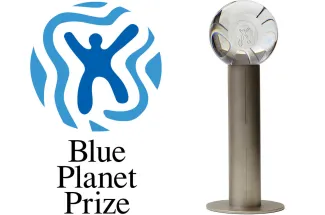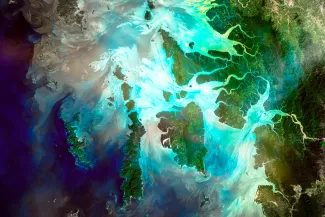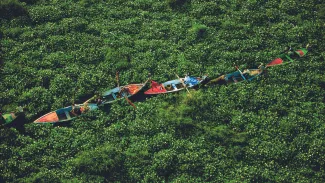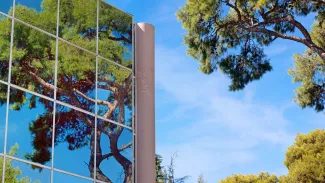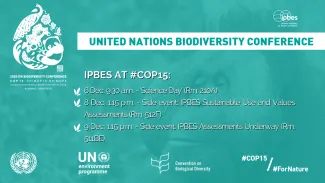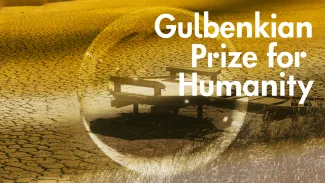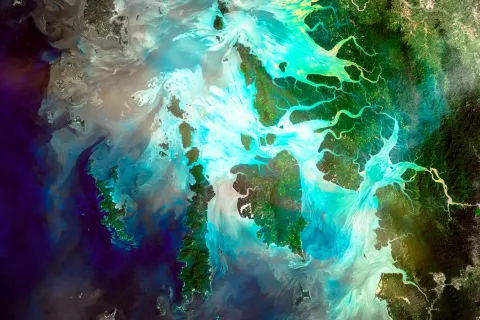
Media Release: On World Environment Day IPBES Announces Co-Chairs & Host Institution for new Multi-Year Assessment on Monitoring Biodiversity & Nature’s Contributions to People
Issued on 5 June 2024 by the Secretariat of the Intergovernmental Science-Policy Platform on Biodiversity and Ecosystem Services
Bonn (IPBES News) – The Intergovernmental Platform on Biodiversity and Ecosystem Services (IPBES) today announced the selection of three prominent scientific experts as co-Chairs to lead a vital new two-year methodological assessment on monitoring biodiversity and nature’s contributions to people.
The urgent need for better capacity to monitor biodiversity around the world has been identified by the 146 member States of IPBES as a priority to support national and global efforts to track progress towards the goals and targets of the Biodiversity Plan (the Kunming-Montreal Global Biodiversity Framework).
Professors Alvaro D’Antona (Brazil), Andrew Gonzalez (Canada/UK), and Patricia Miloslavich (Australia/Venezuela) have been appointed to steer a balanced, interdisciplinary team that will comprise nearly 100 expert authors specializing in the monitoring of biodiversity and nature’s contributions to people in terrestrial, freshwater and marine ecosystems. The other authors will be announced by IPBES in the coming weeks.
The assessment will analyze the data that are currently being generated and assess where geographic coverage exists, which species, ecosystems, and ecosystem services are being covered, as well as the kinds of coverage available over time. It will also examine the gaps and any biases in existing coverage. The assessment will also assess the capacity needed, including financial and institutional aspects, to address gaps, enhance current capacity and build sustainable national and global monitoring systems. The assessment will incorporate diverse knowledge systems, including Indigenous and local knowledge.
Speaking about their selection, Profs. D’Antona, Gonzalez and Miloslavich said: “It is a real honor to head this much-needed fast-track assessment. It will offer concrete options to enhance cooperation, to promote resource-sharing, and to improve understanding of biodiversity change, especially in underrepresented regions of the world. We look forward to using the IPBES conceptual framework to strengthen knowledge about biodiversity monitoring and the causes of biodiversity degradation, to better inform policy and the action that is needed to meet the global targets on nature and sustainable development.”
The assessment will review data collection methods and innovations, as well as existing and new methodologies in biodiversity monitoring, including technologies such as environmental DNA (eDNA), ecological acoustics, camera traps, satellite imagery, and the uses of artificial intelligence.
IPBES Executive Secretary, Dr. Anne Larigauderie, welcomed the announcement: “We warmly congratulate the three new IPBES Co-chairs, and thank them for taking on this crucial responsibility. Their work over the next two years will inform the policy options necessary to address the biodiversity crisis.”
IPBES also announced today the selection of the institution that will host the technical support unit for the assessment: McGill University in Montreal, Canada.
The first author meeting of the assessment is planned for the fourth quarter of 2024 in Montreal – with a first draft of the report expected to be ready for open expert review in 2025.
Alvaro D’Antona is a Professor at the University of Campinas (FCA) in Brazil, also serving as Associate Director of FCA-Unicamp. With a background in economics, anthropology, and social sciences (doctorate in Population Studies, 2003; post-doctorate in Population and Environment, 2004), he specializes in integrating field survey data with national censuses and geospatial analysis. His research spans national and international projects on Population and Environment, focusing on rural Amazonian populations and extended urbanization. Recent projects include proto-urbanization and spatial mobility in Amazonian conservation areas (2023-present), socioenvironmental dynamics in the Rio Negro basin (2021-2023), and involvement with the Brazilian Institute of Data Science (2021-present). Profile
Andrew Gonzalez is a Professor at McGill University and a biodiversity scientist tackling the urgent challenge of runaway biodiversity change and human-induced transformations of our planet's biosphere. At McGill University, his research group explores the ecological and evolutionary drivers and impacts of biodiversity change, investigating extinction rates, evolutionary rescue, and ecosystem connectivity. To bridge the gap between science and action, he co-Chairs GEO BON, a global network of biodiversity scientists, and co-directs the Quebec Centre for Biodiversity Science, promoting collaborative research. Additionally, he co-founded Habitat, a consulting firm providing biodiversity insights. Currently, he is finalizing a book on biodiversity science and striving to implement the Global Biodiversity Observing System. LinkedIn
Patricia Miloslavich is the Program Lead of the East Antarctic Monitoring Program at the Australian Antarctic Division. Formerly the Executive Director of the Scientific Committee on Oceanic Research (SCOR), she has advanced ocean science by addressing global multidisciplinary issues. A marine biologist with a PhD in Oceanography from the University of Quebec at Rimouski, she is a retired senior professor from Simon Bolivar University in Venezuela and remains an ad honorem researcher. Dr. Miloslavich has coordinated international efforts in marine biodiversity and ecosystems, focusing on mitigating anthropogenic pressures through global sustained observations. She is also a dedicated science communicator and policy advisor. LinkedIn
Enquiries: [email protected]
About IPBES:
Often described as the “IPCC for biodiversity”, IPBES is an independent intergovernmental body comprising more than 145 member Governments. Established by Governments in 2012, it provides policymakers with objective scientific assessments about the state of knowledge regarding the planet’s biodiversity, ecosystems and the contributions they make to people, as well as the tools and methods to protect and sustainably use these vital natural assets. For more information about IPBES and its assessments www.ipbes.net
